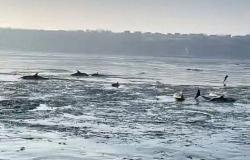1 A double accident in a strategic area
It was last December 15. Caught in a violent storm, two Russian tankers ran aground in the Kerch Strait. A very sensitive area in the context of the war between Russia and Ukraine. This narrow stretch of sea connects the Sea of Azov to the Black Sea, separating Russia (to the east) and the Crimean peninsula (to the west), a Ukrainian territory annexed by the Russians in 2014.
Despite Russian opacity, we know that the ecological catastrophe – to use Vladimir Putin’s expression – is of great magnitude. The two tankers contained more than 9,000 tons of fuel oil, according to Russian authorities, of which an unknown quantity escaped. In the days following the double stranding, the “Russian Riviera” was soiled on dozens of kilometers of beaches. It is a coastline very popular with the wealthy classes, as far as the Olympic city of Sochi in the south.
2 Oil difficult to eliminate
According to the Russian sea rescue service, the product is heavy fuel oil, a fuel obtained from the distillation of crude oil. The Russians claim that it is sinking, which prohibits its recovery at sea. “If it really sank, it would not arrive on the beaches. On the other hand, it can mix with anything found in the marine environment and leave between two waters. But we do not have any precise information,” says Nicolas Marin, deputy director of Cedre, an expert organization in accidental water pollution which has been involved in a number of oil spills. It was not seized in the present case.
Almost tarry in appearance, heavy fuel oil (HFO) does not evaporate like light oil. It causes oil spills that are difficult to combat, like that of the Erika in December 1999 off the coast of Brittany. “A product denser than water will sink into it. This is the case of a product called “black carbon”. The tanker Gino had a cargo of this type when it sank off the coast of Ouessant in 1979,” adds Nicolas Marin.
-3 Shorelines and ecosystem suffer
A Russian association said more than 30 cetaceans had been found dead since the accidents, mainly Black Sea porpoises. Strandings were also noted in Sevastopol, on the Crimean side. according to the Russian Emergency Situations Ministry, almost 120,000 tons of contaminated sand and earth have been removed from the Russian coast. 290 tonnes of petroleum products would have been harvested.
Thousands of people are involved in the cleanup but it is unclear whether or not the Russian war effort in Ukraine is affecting the country’s anti-pollution capabilities. According to Cedre, the Russians a priori have all the necessary equipment. If the fuel oil remains stable, does not evaporate and does not degrade by photo-oxidation (when ultraviolet rays break the molecules), this pollution risks extending over time. Crimea fears upcoming arrivals as massive as those seen on the Russian coast.






